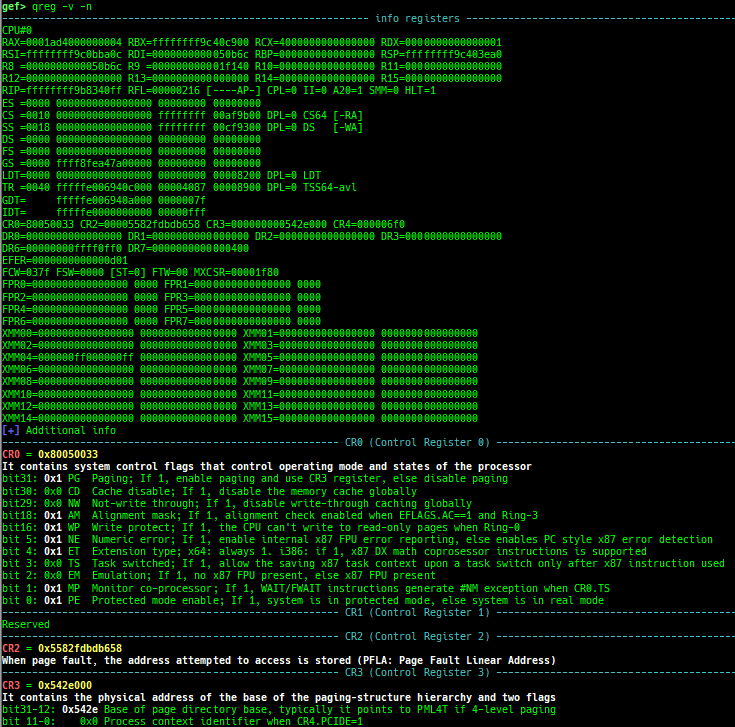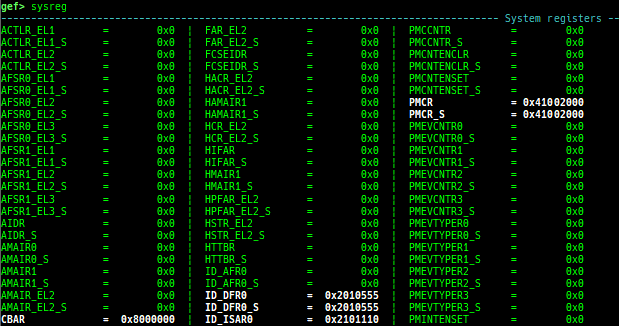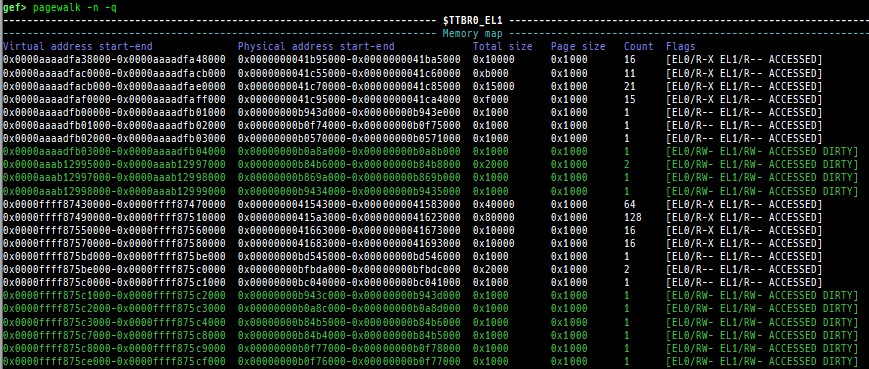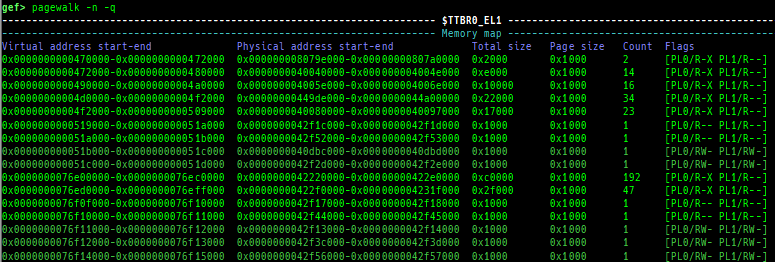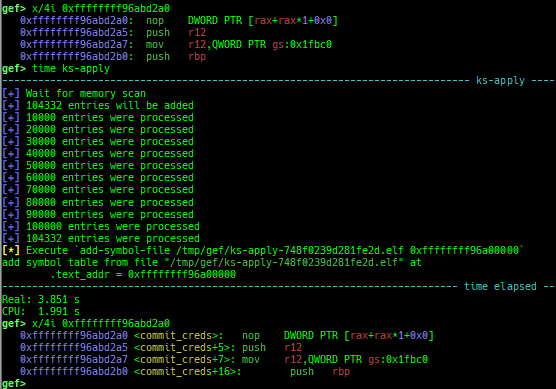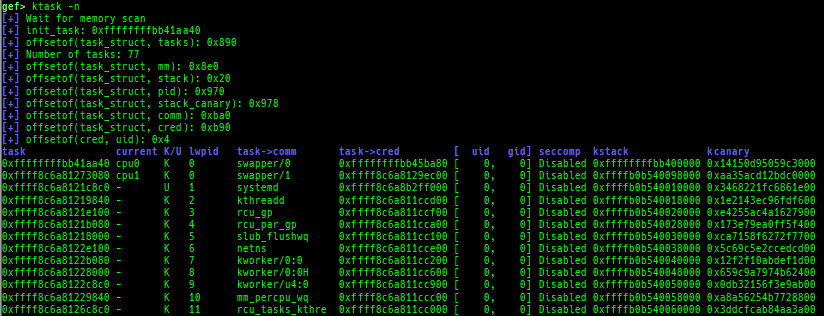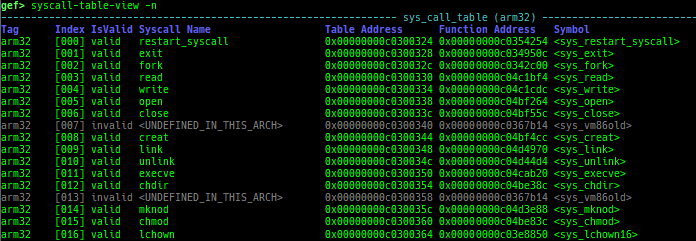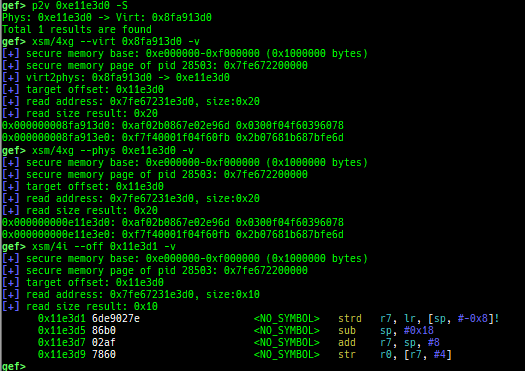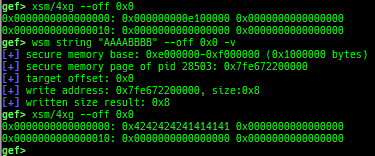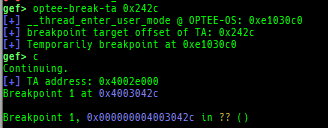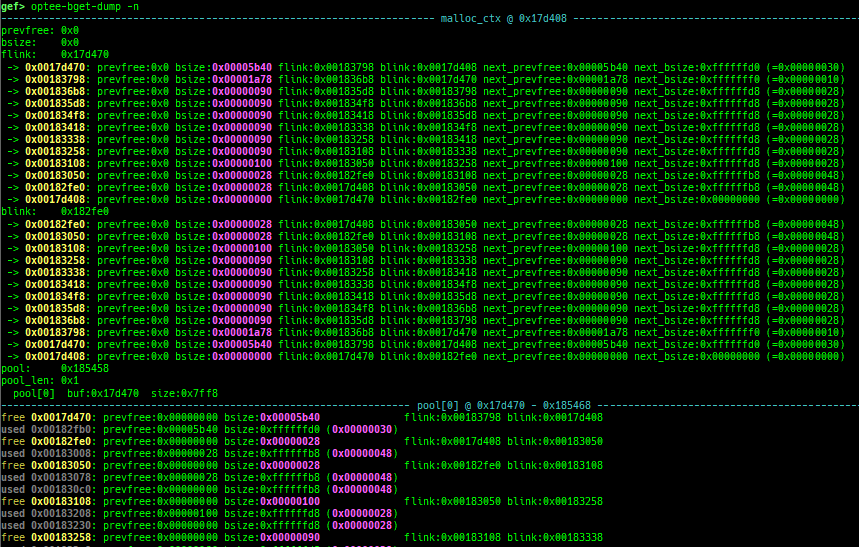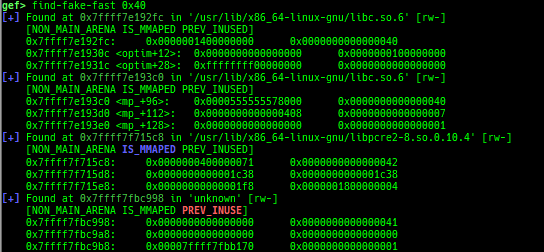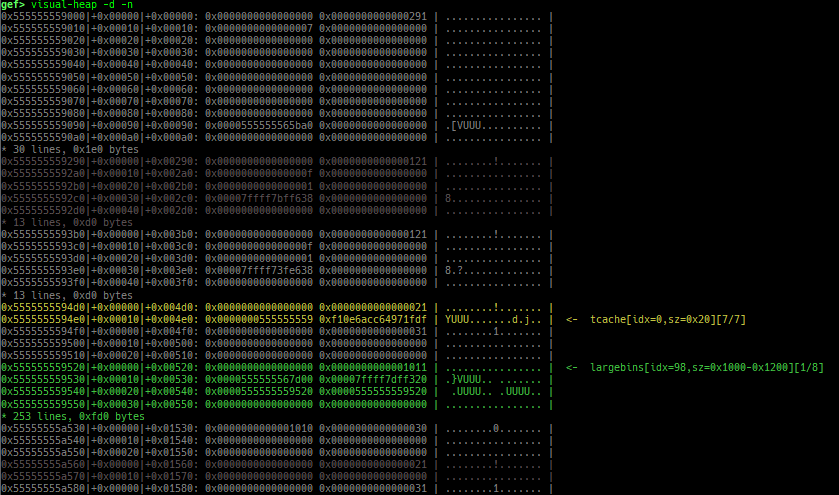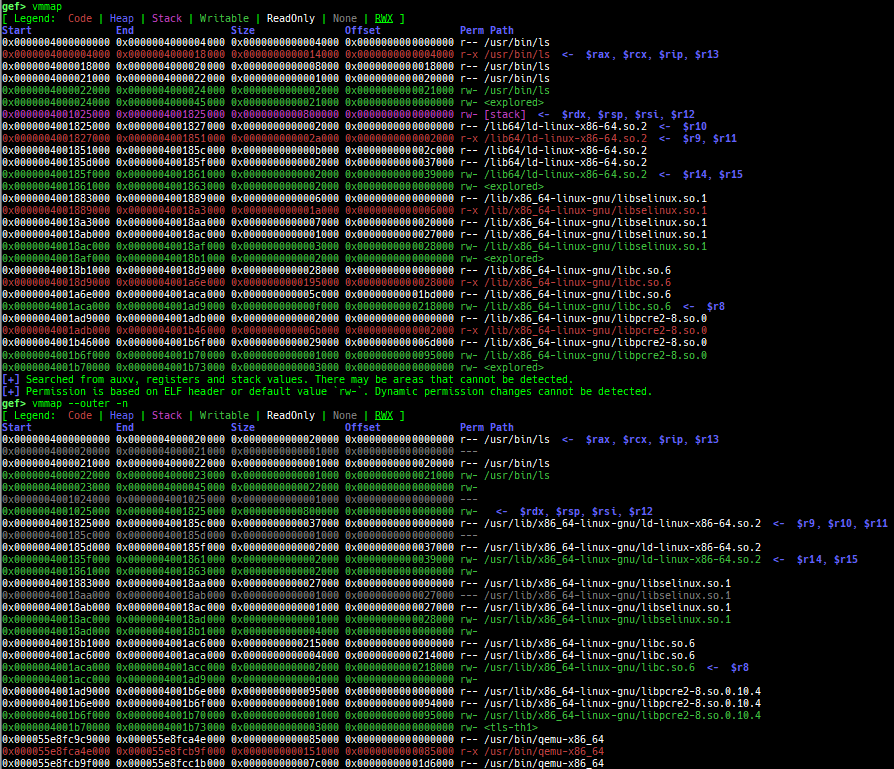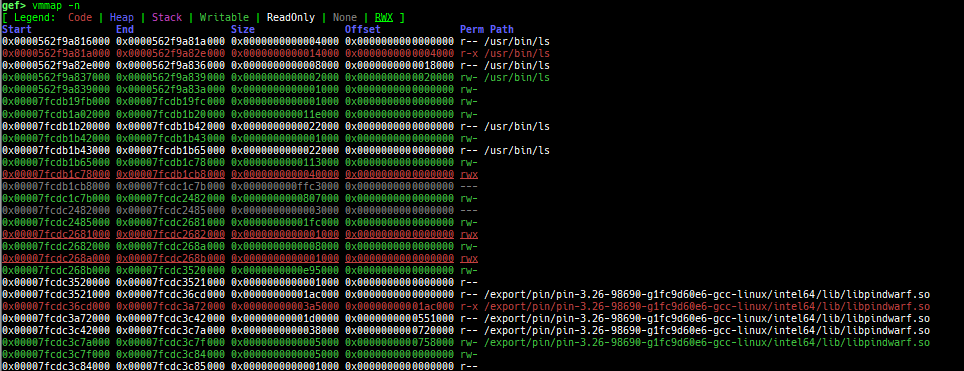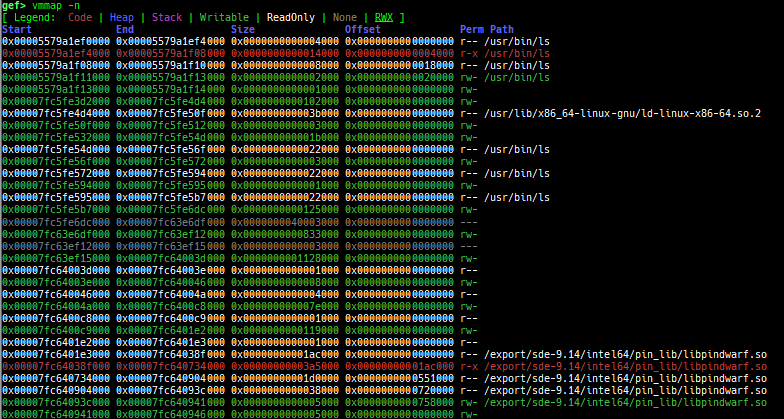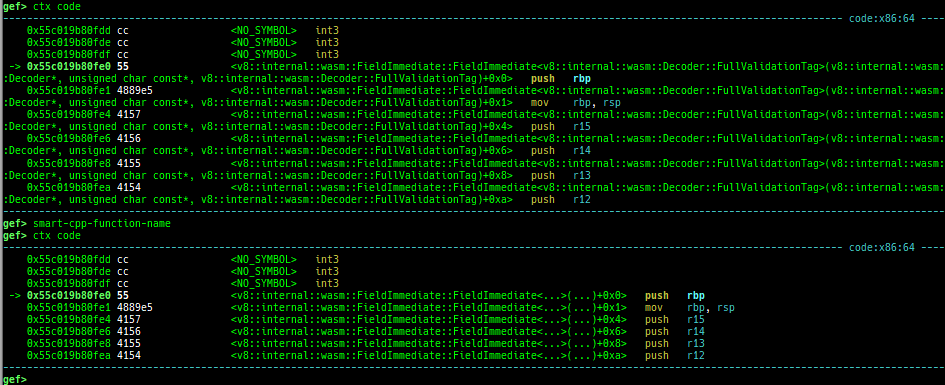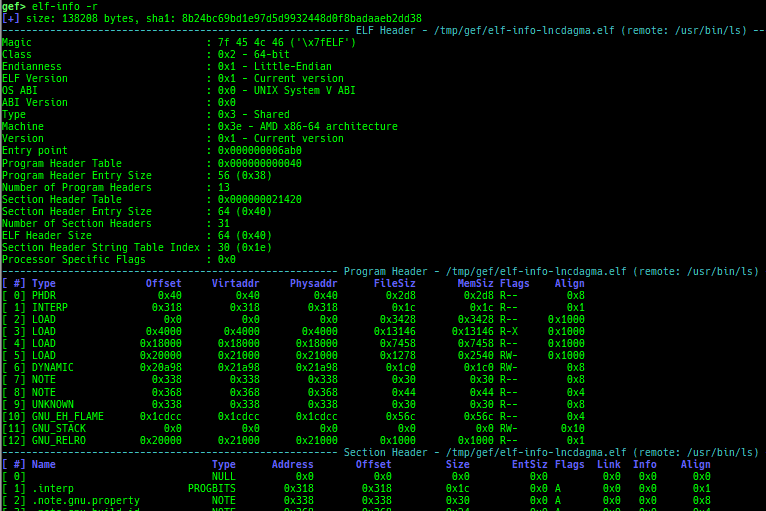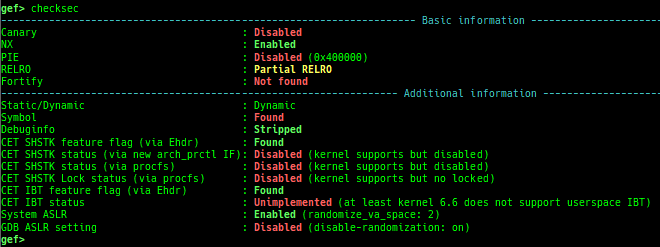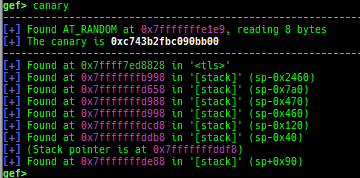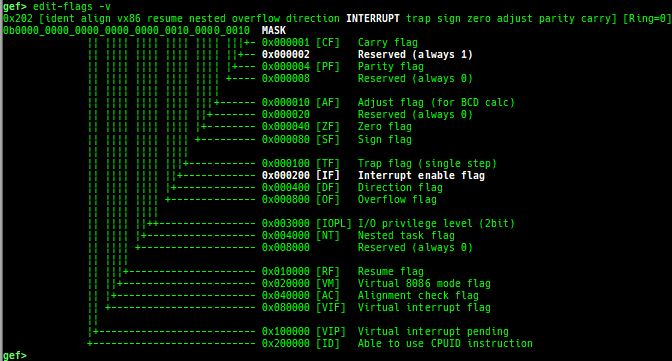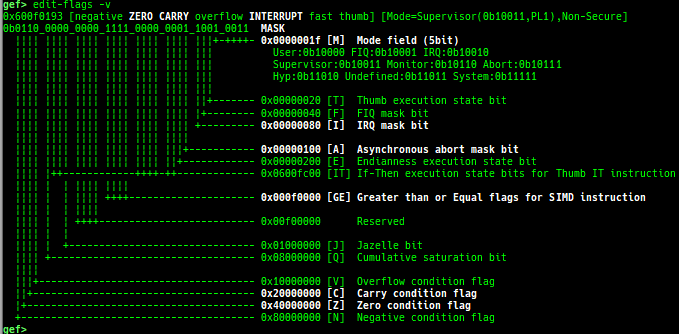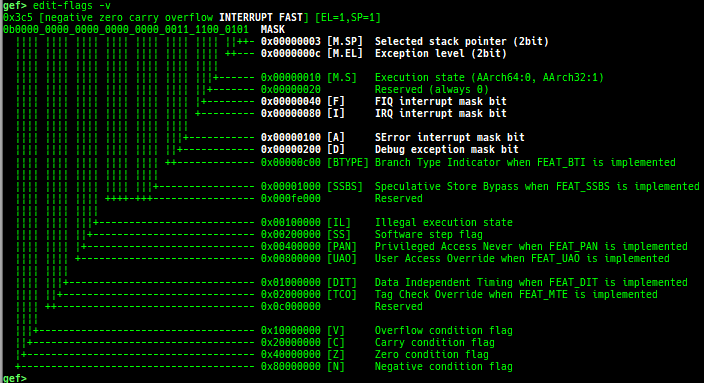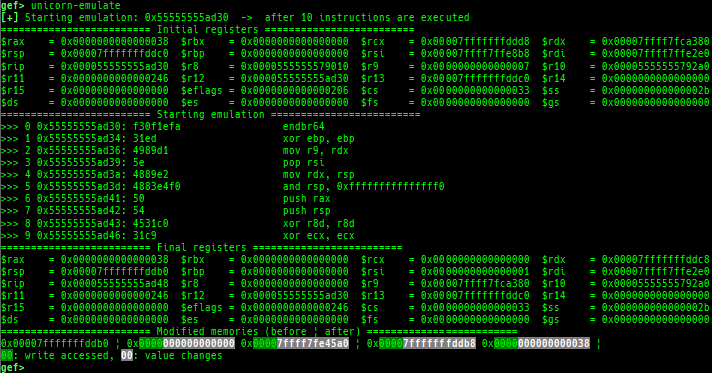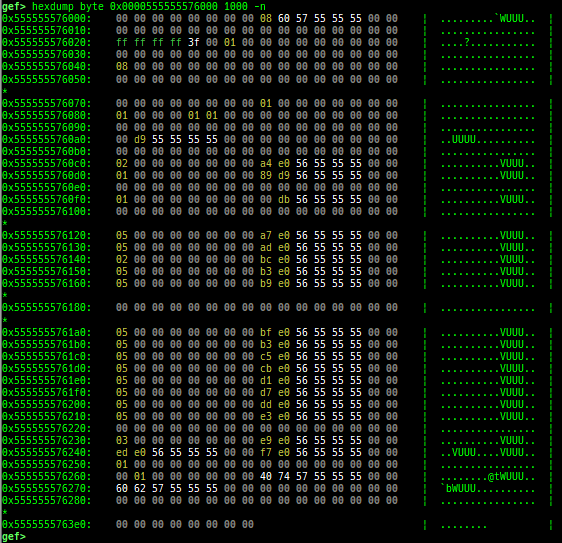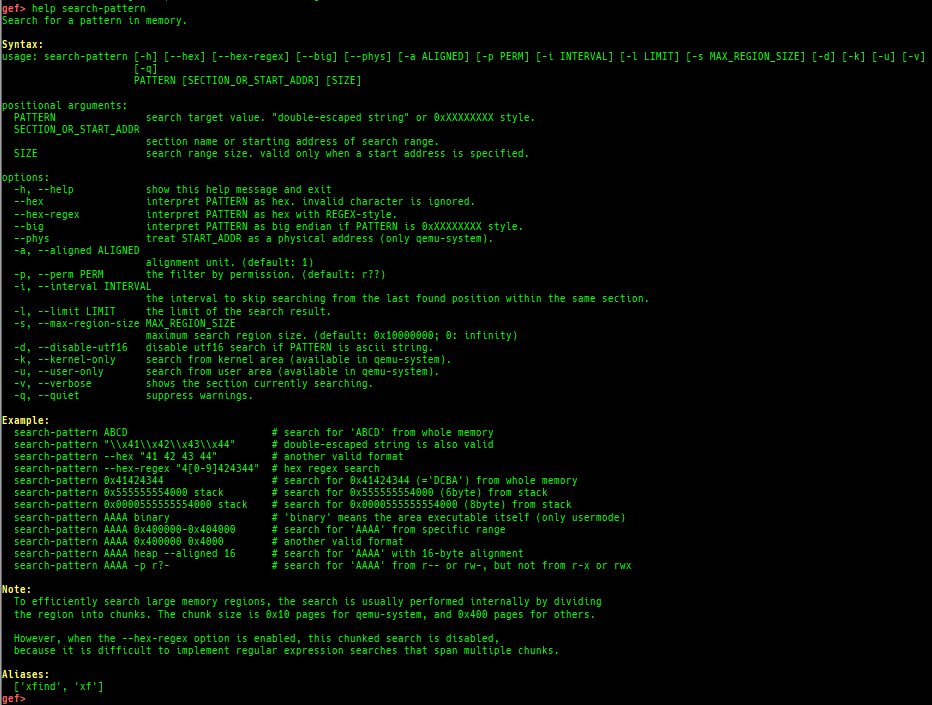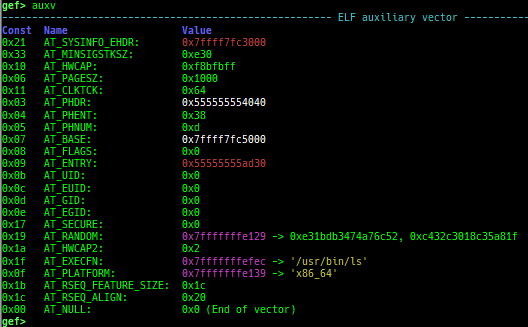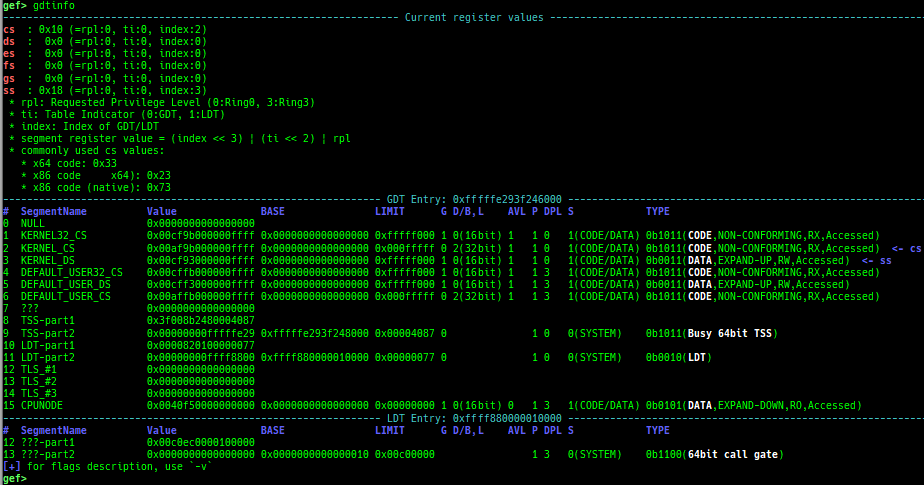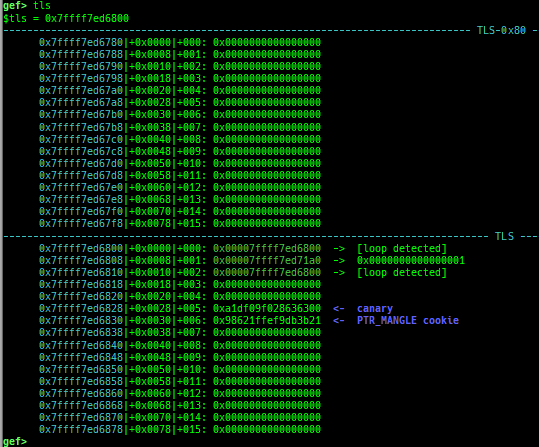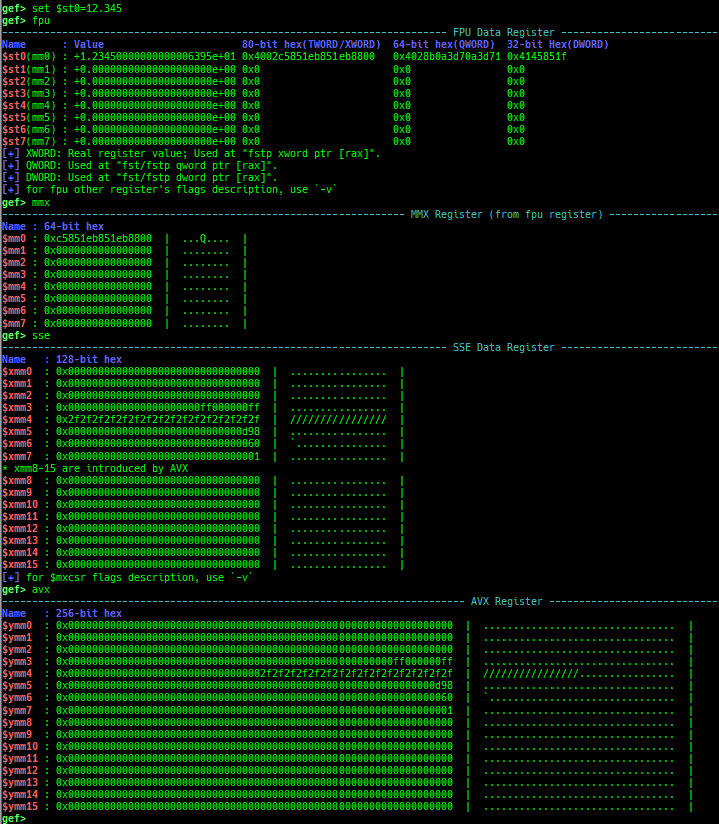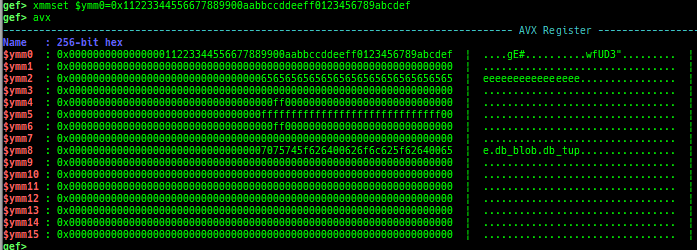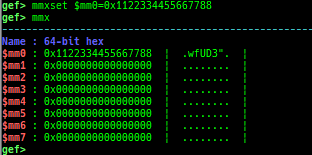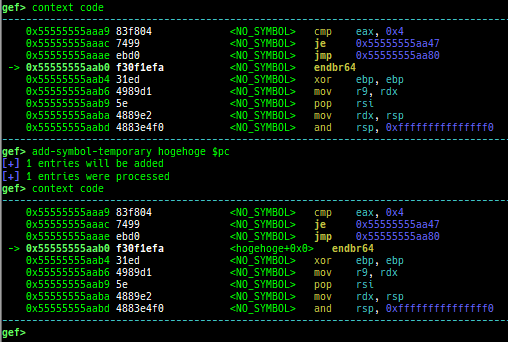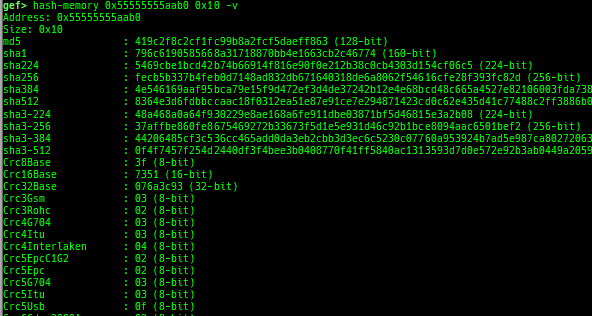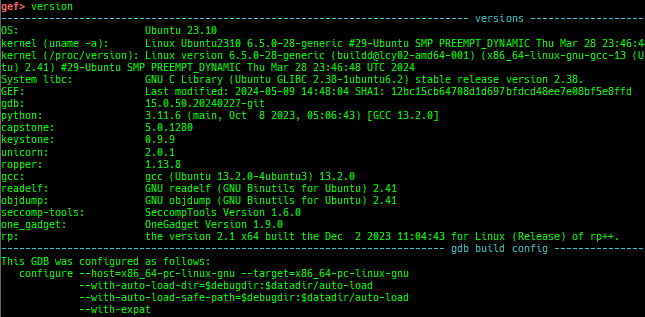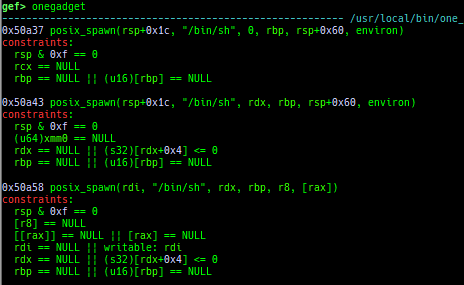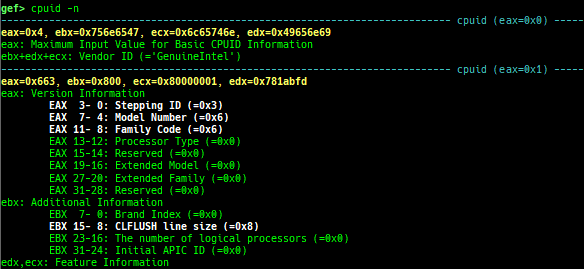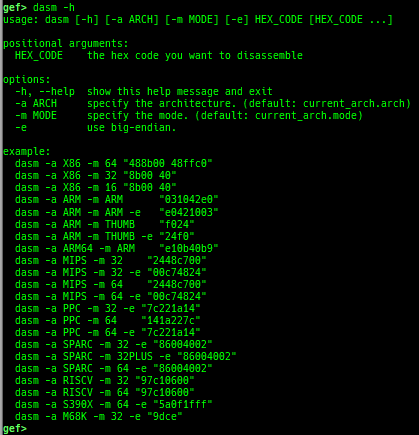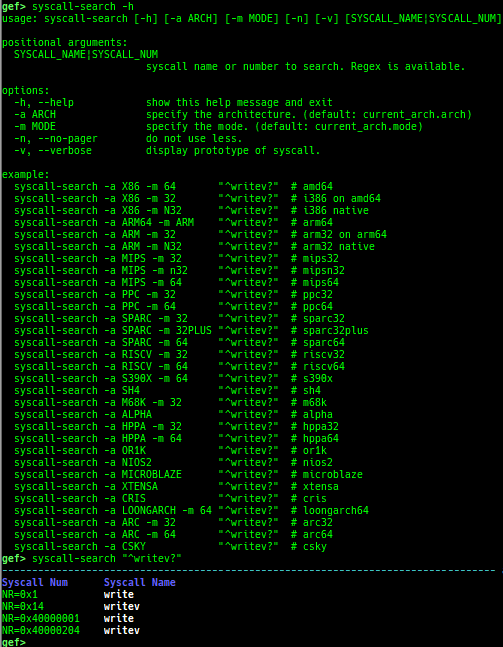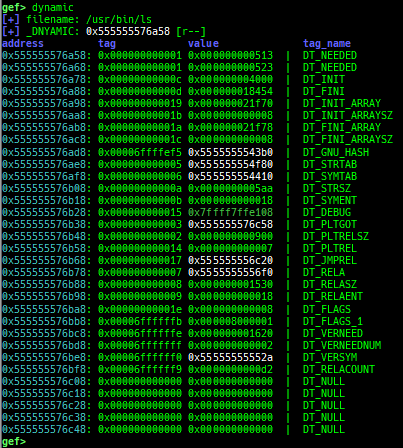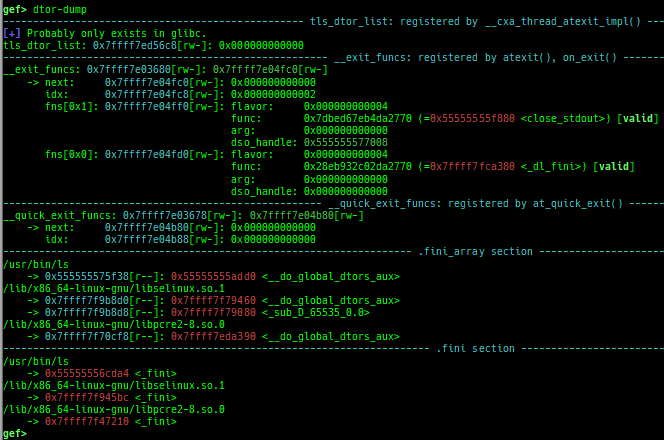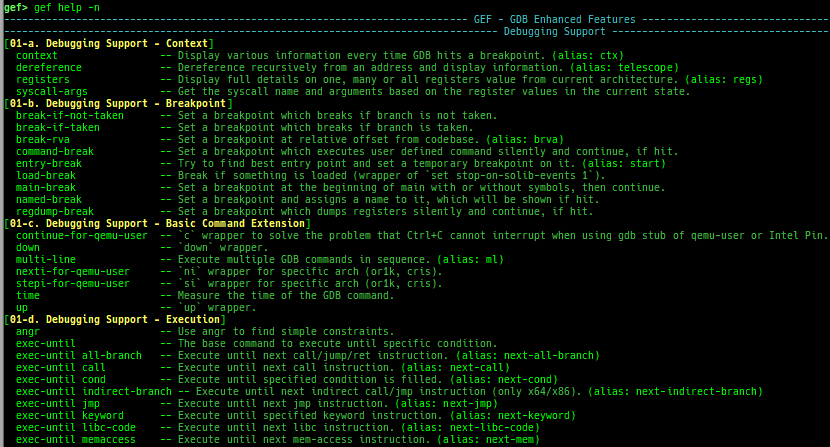This is a fork of GEF. However, it is specialized for x86 / x64 / ARM / AArch64, and various features are added. We hope you find it useful for CTF player, reverser, exploit developer, and so on.
# Run with root user (sudo is NOT recommended)
wget -q https://raw.githubusercontent.com/bata24/gef/dev/install.sh -O- | shpython3 /root/.gdbinit-gef.py --upgraderm -f /root/.gdbinit-gef.py /root/.gef.rcSee install.sh.
All of these features are experimental. Tested on Ubuntu 18.04 / 20.04 / 22.04 / Debian 10.x.
- It works with qemu-system installed via apt, but qemu-6.x or higher is recommended.
- Start qemu with the
-soption and listen onlocalhost:1234. - Attach with
gdb-multiarch -ex 'target remote localhost:1234'.
- Start qemu with the
qreg: prints register values from qemu-monitor (allows to get like$cseven under qemu 2.x).sysreg: pretty prints system registers.pagewalk: prints page table from scanning physical memory.- x64 (Supported: PML5T/PML4T)
- x86 (Supported: PAE/Non-PAE)
- ARM64 (Supported: EL1&0-stage1/EL1&0-stage2/EL2&0-stage1/EL2-stage1/EL3-stage1)
- ARM (Cortex-A only, LPAE/Non-LPAE, PL0/PL1)
v2p,p2v: shows transformation virtual address <-> physical address.xp: is a shortcut for physical memory dump.
ksymaddr-remote: prints kallsyms informations from scanning of kernel memory (heuristic).- Supported: the symbol of kernel itself.
- Unsupported: the symbol of kernel modules.
- Supported on x64/x86/ARM64/ARM.
- Supported on both kASLR is enabled or not.
- Unsupported: to resolve no-function address when kernel built as
CONFIG_KALLSYMS_ALL=n. - This command is faster than
vmlinux-to-elf, but it fails to parse depending on the in-memory layout. 
ksymaddr-remote-apply: applies kallsyms informations obtained byksymaddr-remoteto gdb.vmlinux-to-elf-apply: applies kallsyms informations obtained byvmlinux-to-elfto gdb.slub-dump: dumps slub free-list (heuristic).- Original code: https://github.com/PaoloMonti42/salt
- Supported on x64/x86/ARM64/ARM + SLUB.
- Unsupported: SLAB, SLOB.
- Supported on both kASLR is enabled or not.
- Supported on both
CONFIG_SLAB_FREELIST_HARDENEDisyorn. - Supported on both the vmlinux symbol exists or not.
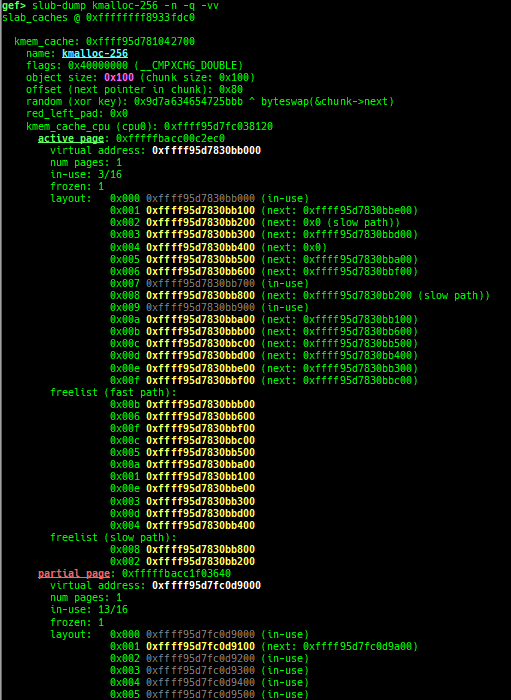
kbase: prints kernel base address.kversion: displays the debugged kernel version.kcmdline: displays the debugged kernel startup cmdline.ktask: displays each task address.kmod: displays each module address.kcdev: displays character devices informations.kfops: displays fops members.syscall-table-view: prints system call table (x64/x86/ARM64/ARM only).thunk-hunter: collects and displays the thunk addresses that are called automatically (x64/x86 only).usermodehelper-hunter: collects and displays information that is executed bycall_usermodehelper_setup.
msr: prints MSR (Model Specific Registers) values by embedding/executing dynamic assembly.xsm: dumps secure memory when gdb is in normal world.wsm: writes the value to secure memory when gdb is in normal world.bsm: set the breakpoint to secure memory when gdb is in normal world.optee-break-ta: set the breakpoint to the offset of OPTEE-Trusted-App when gdb is in normal world.
uefi-ovmf-info: displays addresses of some important structures in each boot phase of UEFI when OVMF is used (heuristic).
partition-alloc-dump-stable: dumps partition-alloc free-list (heuristic).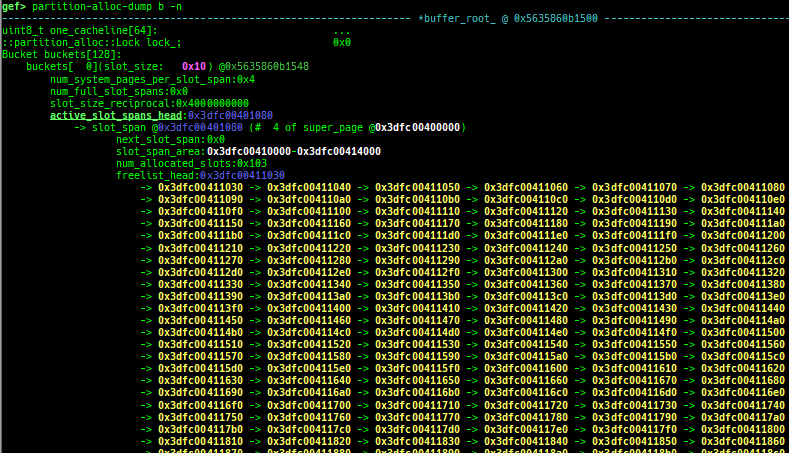
- This command is reserved for the implementation of latest stable version of chromium.
- Currently tested: v103.x / 1003490 / 4f4be3c1f3ff682c9fdd0dbe133ae1bc32761b0a
- https://commondatastorage.googleapis.com/chromium-browser-snapshots/index.html?prefix=Linux_x64/1003490/
- Supported on x64 only (maybe it works on x86/ARM/ARM64, but not tested).
- It will try heuristic search if binary has no symbol.
partition-alloc-dump-beta: dumps partition-alloc free-list (heuristic).- This command is reserved for the implementation of latest beta version of chromium.
- Currently tested: v104.x / 1013129 / af492a3f41a3aad84b5af515bddf2e72f4d2c1a0
- https://commondatastorage.googleapis.com/chromium-browser-snapshots/index.html?prefix=Linux_x64/1013129/
- This command is reserved for the implementation of latest beta version of chromium.
partition-alloc-dump-dev: dumps partition-alloc free-list (heuristic).- This command is reserved for the implementation of latest dev version of chromium.
- Currently tested: v105.x / 1018618 / d6cd4585b3811efa5a14960490ef9ceacb382cae
- https://commondatastorage.googleapis.com/chromium-browser-snapshots/index.html?prefix=Linux_x64/1018618/
- This command is reserved for the implementation of latest dev version of chromium.
partition-alloc-dump-old1: dumps partition-alloc free-list (heuristic).- For the implementation in 2021 Jul (tested on
Google CTF 2021 - fullchain). - Not maintained for a while.
- For the implementation in 2021 Jul (tested on
partition-alloc-dump-old2: dumps partition-alloc free-list (heuristic).- For the implementation in 2020 Jun (tested on
0CTF 2020 - chromium fullchain). - Not maintained for a while.
- For the implementation in 2020 Jun (tested on
tcmalloc-dump: dumps tcmalloc free-list (heuristic).- For tcmalloc, there are 3 major versions.
- tcmalloc that is a part of gperftools published in 2005: supported.
- tcmalloc that is included in chromium: supported. (For the implementation in 2020 Jun. Tested on
0CTF 2020 - chromium fullchain). - tcmalloc that is maintained in Google Inc. published in 2020: unsupported.
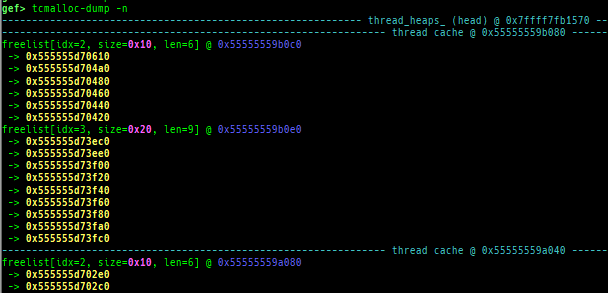
- Not maintained for a while.
- For tcmalloc, there are 3 major versions.
musl-dump: dumps musl-libc unused chunks (heuristic).optee-bget-dump: dumps bget allocator of OPTEE-Trusted-App.
- Glibc heap commands are improved.
- Thread arena is supported for all heap commands.
- Use
-aoption.
- Use
- They print info if the chunk is in free-list.
find-fake-fast: searches for a memory with a size-like value that can be linked to the fastbin free-list.visual-heap: is colorized heap viewer.extract-heap-addr: analyzes tcache-protected-fd introduced from glibc-2.32.
- Thread arena is supported for all heap commands.
vmmap: is improved.registers: is improved.- It also shows raw values of
$eflagsand$cpsr. - It prints current ring for x64/x86 when prints
$eflags(Ring state is from$cs). - It prints current exception level for ARM64 when prints
$cpsr(Secure state is from$SCR_EL3). - It prints current mode for ARM when prints
$cpsr(Secure state is from$SCR).
- It also shows raw values of
context: is improved.- It supports automatic display of system call arguments when calling a system call.
- It supports automatic display of address and value when accessing memory.
- It supports smart symbol printing for cpp function.
telescope: is improved.procinfo: is improved.elf-info: is improved.checksec: is improved.- It prints whether Static or Dynamic.
- It prints whether Stripped or not.
- It detects canary against static stripped binary.
- It prints whether Intel CET instructions (endbr64/endbr32) is found or not.
- It prints whether RPATH/RUNPATH is set or not.
- It prints if Clang CFI/SafeStack is used or not.
- It prints whether System-ASLR is enabled or not.
- It prints whether GDB ASLR setting is enabled or not.
got: improved.canary: is improved.edit-flags: is improved.unicorn-emulate: is improved.ropper: is improved.- It does not reset autocomplete settings after calling imported ropper.
hexdump: is improved.patch: is improved.search-pattern: is improved.
pid: prints pid.filename: prints filename.auxv: pretty prints ELF auxiliary vector.argv: pretty prints argv.envp: pretty prints envp.gdtinfo: pretty prints GDT sample.tls: pretty prints TLS area.fsbase,gsbase: pretty prints$fs_base,$gs_base.magic: is useful addresses resolver in gilbc.libc/ld/heapbase/codebase: prints each of the base address.fpu/mmx/sse/avx: pretty prints FPU/MMX/SSE/AVX registers.xmmset: sets the value to xmm/ymm register simply.mmxset: sets the value to mm register simply.exec-until: executes until specific operation.exec-next: executes until next address.- This is useful for the operation with
repprefix.
- This is useful for the operation with
add-symbol-temporary: adds symbol information from command-line.errno: prints errno list or specific errno.u2d: shows cast/transformation u64 <-> double/float.pack,unpack: shows transformation int <-> bytes/hex.tohex,unhex: shows transformation hex <-> bytes.byteswap: shows transformation little-endian <-> big-endian.hash-memory: calculates the hash.memcmp: compares the contents of address A and B, whether virtual or physical.memcpy: copies the contents from address A to B, whether virtual or physical.is-mem-zero: checks the contents of address range is all 0x00 or 0xff or not.pdisas: is a shortcut forcs-dis $pc LENGTH=50 OPCODES.ii: is a shortcut forx/50i $pc.version: shows software version that gef used.follow: changesfollow-fork-modesetting.smart-cpp-function-name: togglescontext.smart_cpp_function_namesetting.seccomp: invokesseccomp-tools.onegadget: invokesone_gadget.ls/cat: invokesls/catdirectly.constgrep: invokesgrepunder/usr/include.time: measures the time of the GDB command.rp: invokesrp++with commonly used options.- Supports both rp++ v1 and v2.
cpuid: shows the result of cpuid(eax=0,1,2...).dasm: disassembles the code by capstone.asm-list: lists up instructions. (only x86/x64)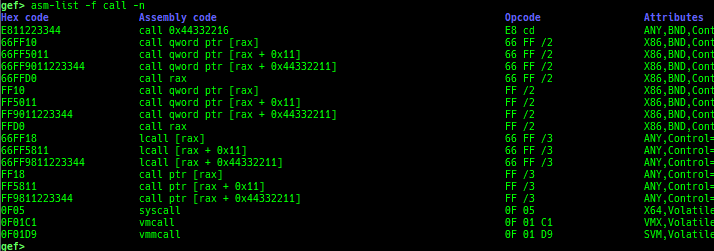
- This command uses x86data.js from https://github.com/asmjit/asmdb
syscall-search: searches system call by regex.dwarf-exception-handler: dumps the DWARF exception handler informations.dynamic: dumps the DYNAMIC area.linkmap: dumps linkmap with iterating.ret2dl-hint: shows the structure used by ret2dl as hint.srop-hint: shows the code for srop as hint.dtor-dump: dumps some destructor functions list.linklist-walk: walks link list.ptr-demangle: shows the demangled value of the value mangled byPTR_MANGLE.search-mangled-ptr: searchs the mangled value from RW memory.
- The category is introduced in
gef help. - Combined into one file (from gef-extra).
peek-pointers,current-stack-frame,xref-telescope,bytearray,bincompare,ftraceandv8derefare moved from gef-extras.- This is because a single file is more attractive than ease of maintenance.
- The system-call table used by
syscall-argsis moved from gef-extras.- It was updated up to linux kernel 5.18-rc6 (only x64/x86/ARM64/ARM).
- Since there are many exceptions at system calls for each architecture, arguments information of system call was picked up manually.
- Removed some features I don't use.
ida-interact,gef-remote,pie,pcustom,ksymaddr,shellcodeandhighlight.
- Many bugs fix / formatting / made it easy for me to use.
